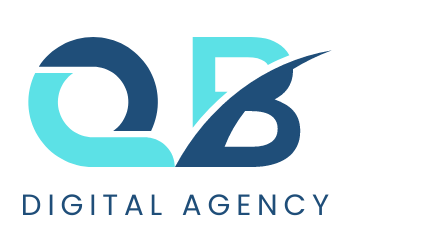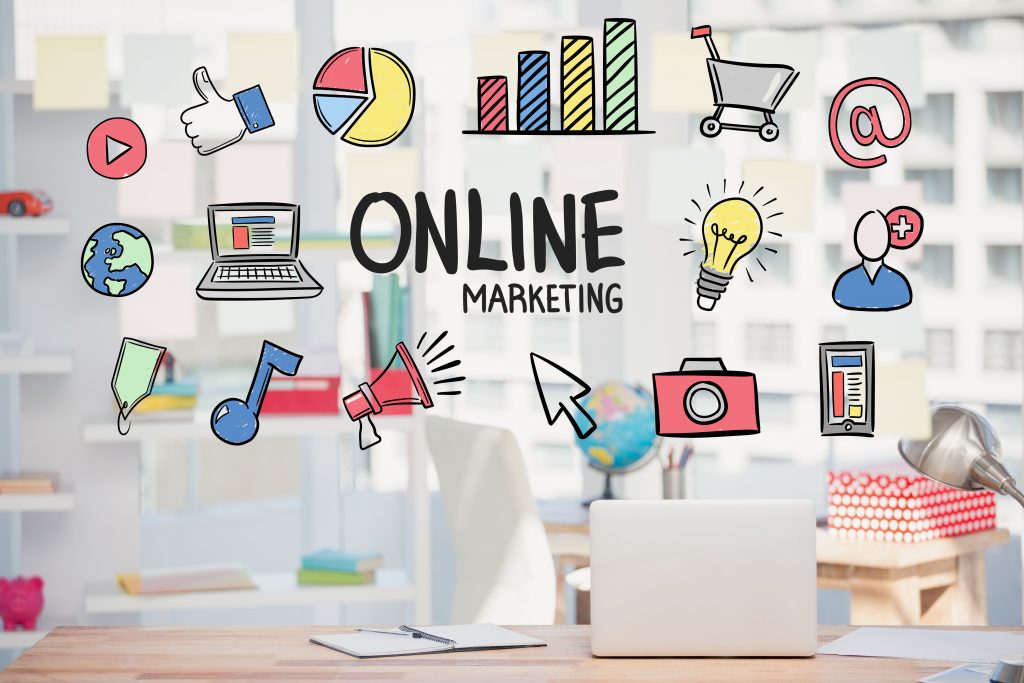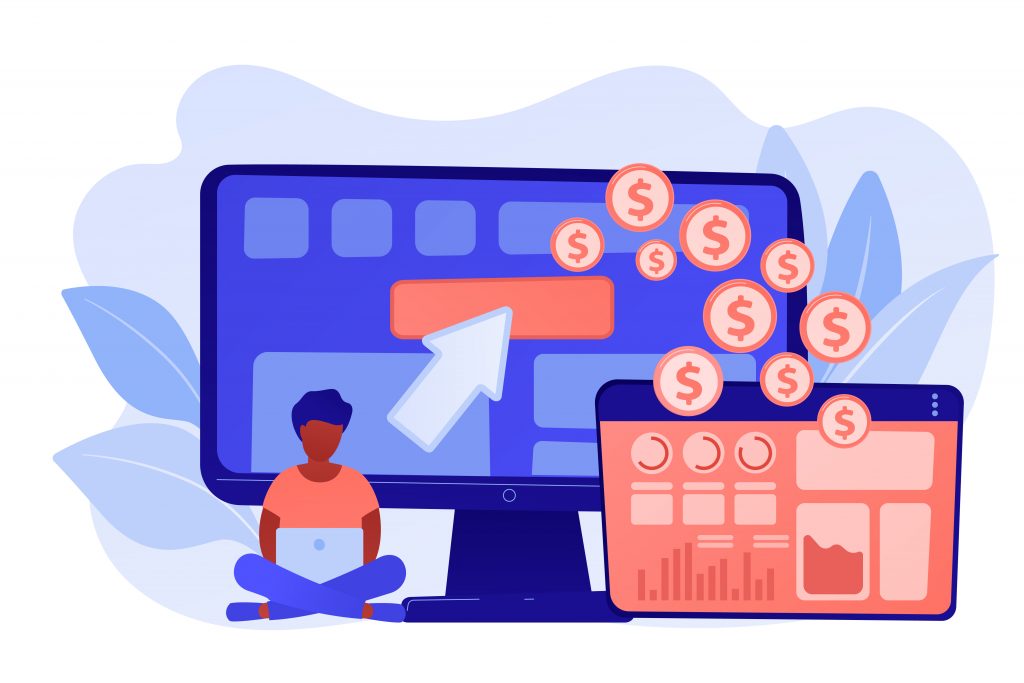1. Introduction to Digital Marketing
Digital marketing, a rapidly evolving field, refers to the use of digital channels and platforms to promote products, services, and brands. Its scope has expanded dramatically in the past two decades, transforming how businesses reach and engage with their audience. This shift is a direct result of technological advancements and changing consumer behaviors. Digital marketing incorporates everything from social media to email, search engine optimization (SEO), content marketing, and more, offering a range of strategies that can be tailored to any business.
Historically, marketing relied heavily on traditional forms such as print, television, and radio advertising. While these methods remain relevant, the digital age has ushered in new avenues for engaging consumers. Today, nearly every business, large or small, leverages some form of digital marketing, whether it’s through simple websites or complex multi-platform campaigns.
The importance of digital marketing cannot be overstated. As the world continues to become more interconnected online, businesses must adapt their marketing strategies to meet the digital-first expectations of today’s consumers. Digital marketing is not just about driving sales, but also about building long-term relationships with customers by providing them value through content, engagement, and personalized experiences.
2. Key Components of Digital Marketing
Digital marketing is multifaceted, encompassing a wide variety of strategies that work together to drive business success. These strategies include:
- Search Engine Optimization (SEO): The process of optimizing content to rank higher in search engine results, driving organic traffic.
- Content Marketing: Creating and distributing valuable, relevant content to attract and engage a target audience.
- Social Media Marketing: Leveraging platforms like Facebook, Instagram, LinkedIn, and TikTok to promote products, services, and brand awareness.
- Email Marketing: A highly effective channel for engaging with audiences, promoting offers, and building long-term customer relationships.
- Pay-Per-Click Advertising (PPC): A paid marketing strategy where businesses pay for each click on their online ads, commonly used on platforms like Google Ads.
- Affiliate Marketing: Collaborating with external partners to promote products or services for a commission.
- Influencer Marketing: Leveraging individuals with large online followings to promote products and influence purchasing decisions.
Each of these components plays a unique role in a business’s overall digital marketing strategy. By effectively combining these techniques, brands can maximize their reach, drive engagement, and improve conversion rates.
3. The Role of Data in Digital Marketing
Data is the backbone of modern digital marketing. The ability to track, measure, and analyze consumer behavior allows marketers to make informed decisions. By leveraging data, marketers can optimize campaigns in real time, ensuring they are engaging the right audience with the right message at the right time.
Analytics tools, such as Google Analytics, offer insights into website traffic, conversion rates, and customer behavior, helping businesses fine-tune their strategies. Additionally, data enables personalization, a key trend in digital marketing. Personalized marketing can improve customer satisfaction, as it provides users with content that is tailored to their specific preferences and behaviors.
Data also plays a crucial role in audience segmentation. Marketers can divide their audience based on demographics, behaviors, and interests, allowing them to create more targeted and relevant campaigns.
4. Search Engine Optimization (SEO)
SEO remains one of the most critical elements of digital marketing. It focuses on improving a website’s visibility in organic (non-paid) search engine results. On-page SEO involves optimizing web pages by using relevant keywords, meta descriptions, and high-quality content to ensure that search engines like Google rank the website higher. Off-page SEO, on the other hand, includes strategies like link-building, where external websites link back to a business’s site, boosting its credibility and authority.
The future of SEO is tied closely to technological developments. Voice search, for instance, is becoming more prevalent with devices like Alexa and Google Assistant, prompting marketers to optimize for conversational queries. SEO strategies will need to continue evolving as search engines’ algorithms become more sophisticated.
Continuing from where we left off, the next sections delve deeper into other critical aspects of digital marketing. Let’s explore content marketing, social media’s role, email strategies, and how artificial intelligence is shaping the industry’s future.
5. The Power of Content Marketing
Content marketing is a core pillar of digital marketing, built around the creation and distribution of valuable, relevant, and consistent content. Its goal is to attract and retain a clearly defined audience while driving profitable customer actions. The old adage, “Content is king,” holds true today as consumers increasingly seek out content that entertains, informs, or solves problems.
Content marketing goes beyond blog posts. It encompasses:
- Blogging: Regularly publishing informative, keyword-rich blog articles helps build authority and drive organic traffic. Blogs allow businesses to position themselves as thought leaders within their industry.
- Vlogging and Podcasts: Video blogging (vlogging) and podcasts are growing in popularity as more consumers turn to multimedia content. YouTube, for instance, is the second-largest search engine, while podcasts offer on-the-go learning and entertainment.
- Infographics and E-books: These formats simplify complex information, making it digestible and shareable.
- Storytelling: A powerful tool, storytelling connects emotionally with an audience, creating a memorable brand image and building customer loyalty.
The future of content marketing lies in interactive content—quizzes, polls, surveys, and calculators that actively engage users. Furthermore, video content is expected to dominate. Short, engaging videos on platforms like TikTok or Instagram Reels are becoming critical for brands looking to capture attention in a fast-paced digital world. With evolving technologies like AR (augmented reality) and VR (virtual reality), immersive content is becoming another exciting frontier for marketers.
6. Social Media’s Impact on Digital Marketing
Social media marketing is one of the most dynamic elements of digital marketing. It offers brands unprecedented access to their audience, allowing for direct interaction and real-time engagement. Whether through Facebook, Instagram, Twitter, LinkedIn, or emerging platforms like TikTok, social media allows businesses to humanize their brand, showcase products, and foster community.
Key trends and strategies include:
- Organic vs Paid Strategies: Organic social media marketing focuses on growing followers and engagement without paid promotion. In contrast, paid strategies (e.g., Facebook Ads, Instagram Ads) allow businesses to target specific demographics and retarget users who have already interacted with the brand.
- Social Commerce: The integration of e-commerce directly into social platforms (e.g., Instagram Shopping) makes it easier for users to purchase products without leaving the app, streamlining the buying process.
- Influencer Partnerships: Collaborating with influencers who have large followings can significantly boost brand visibility. Influencer marketing allows businesses to tap into trusted communities and enhance brand credibility.
The future of social media marketing is bright. As AI becomes more integrated into social platforms, the potential for predictive targeting and AI-driven content recommendations will grow. Additionally, social commerce is expected to expand, with platforms like Instagram and TikTok evolving into robust sales channels. The metaverse is also an emerging concept in digital marketing, where brands may soon engage with customers in fully immersive digital spaces.
7. Email Marketing: Still Relevant?
Despite the rise of new communication channels, email marketing remains one of the most effective digital marketing strategies. Far from being outdated, email continues to offer high returns on investment (ROI), with $42 earned for every $1 spent, according to some estimates.
Key factors contributing to the ongoing relevance of email marketing include:
- Personalization: Today’s consumers expect personalized communication. By using data and segmentation, businesses can send highly targeted emails that resonate with individual recipients, whether through product recommendations or customized offers.
- Automation: Automation tools enable brands to set up drip campaigns that nurture leads and move them through the sales funnel. This not only saves time but ensures consistent communication.
- Segmentation: Dividing email lists based on user behavior (e.g., past purchases, engagement with the brand) allows businesses to send more relevant content, which can significantly increase open and click-through rates.
- Mobile Optimization: With more people checking emails on their mobile devices, it is crucial that emails are mobile-friendly and visually appealing on smaller screens.
As for the future, email marketing will become increasingly integrated with other digital marketing channels. Marketers will leverage AI for predictive sending—anticipating the best time to send emails for individual users. Moreover, interactive email elements (like embedded videos or clickable elements) are set to become more popular, keeping users engaged without leaving their inboxes.
8. Pay-Per-Click (PPC) Advertising
Pay-per-click (PPC) advertising is another essential aspect of digital marketing, providing a quick way to drive traffic to websites by paying each time an ad is clicked. Unlike organic strategies, PPC offers businesses the chance to get immediate visibility and results. PPC is commonly used on platforms such as Google Ads, Facebook Ads, and LinkedIn Ads.
Key PPC strategies include:
- Keyword Targeting: Carefully selecting the right keywords ensures that ads appear to users searching for relevant terms.
- Conversion Rate Optimization (CRO): Optimizing landing pages and ads to maximize the likelihood that visitors will convert (i.e., take a desired action, such as making a purchase).
- Retargeting: Retargeting ads are served to users who have previously visited a website but did not convert. These ads encourage users to return and complete the desired action.
- A/B Testing: Continuously testing different versions of ads helps optimize performance by determining which ad copy, imagery, or calls-to-action resonate best with the audience.
The future of PPC lies in AI-driven bidding strategies and automation tools that allow for smarter, more efficient ad management. As machine learning algorithms become more advanced, marketers will rely increasingly on AI to adjust bids in real-time, ensuring the most cost-effective results. Additionally, with the growing importance of voice search, voice-driven PPC ads may become a reality, changing the way brands target their audience.
9. Affiliate and Influencer Marketing
Affiliate and influencer marketing have become mainstream strategies in the digital landscape. Both models rely on partnerships to drive brand awareness and sales, but they operate in slightly different ways.
- Affiliate Marketing: This involves businesses partnering with affiliates (individuals or other businesses) who promote products or services in exchange for a commission on sales. The affiliates use various channels, such as blogs, social media, and email, to drive traffic and sales.
- Influencer Marketing: This strategy involves working with individuals who have large, engaged followings on social media or other platforms to promote a brand’s products. Influencers act as trusted voices, and their endorsement can significantly impact their audience’s purchasing decisions.
Both affiliate and influencer marketing offer performance-based models, meaning brands only pay when a sale or desired action occurs. For businesses, this makes it a low-risk, high-reward strategy.
Looking ahead, micro-influencers (influencers with smaller, highly engaged audiences) are expected to play a more significant role, as brands look for more authentic, intimate connections with their target markets. Moreover, as social media platforms evolve, live shopping events hosted by influencers are gaining traction, allowing influencers to sell products in real time.
10. Artificial Intelligence (AI) in Digital Marketing
AI has revolutionized digital marketing, enabling businesses to streamline operations, enhance customer experiences, and improve personalization. The role of AI in digital marketing includes:
- Automation: AI-powered tools can handle repetitive tasks such as scheduling posts, sending emails, and managing ad campaigns, freeing up marketers to focus on strategic initiatives.
- Chatbots: AI-driven chatbots provide real-time customer support, answering queries, resolving issues, and guiding users through purchasing processes, all without human intervention.
- Predictive Analytics: AI can analyze data patterns to predict future consumer behaviors, helping marketers tailor their strategies to meet emerging trends. Predictive analytics also aids in lead scoring, ensuring that businesses prioritize their most valuable prospects.
As AI continues to advance, its role in content creation will grow. Already, AI tools can generate basic written content or assist with design work, such as creating social media posts or even entire blog articles. Additionally, AI-driven personalization will reach new heights, delivering hyper-targeted marketing experiences that align perfectly with individual consumer preferences.
11. The Future of Digital Marketing Tools
The digital marketing landscape is constantly evolving, and tools that help marketers streamline processes, analyze data, and optimize campaigns are crucial for maintaining a competitive edge. Over the years, a myriad of tools has emerged, each designed to assist with specific aspects of marketing. From customer relationship management (CRM) software to analytics platforms, these tools are helping marketers reach audiences more efficiently and effectively.
Some of the key trends in the evolution of digital marketing tools include:
- Automation Platforms: Marketing automation platforms, such as HubSpot, Marketo, and Mailchimp, enable businesses to automate repetitive tasks like email campaigns, social media posting, and lead nurturing. As automation technology improves, these platforms will become even more sophisticated, reducing the manual workload for marketers while optimizing the customer journey.
- Customer Relationship Management (CRM) Systems: CRM tools help businesses manage customer relationships by tracking interactions, sales data, and behavior across multiple channels. As CRM tools become more integrated with AI, they will offer more predictive insights, helping businesses personalize customer interactions and predict future behavior.
- Martech Stacks: Marketing technology (martech) stacks refer to the suite of tools a business uses to execute and manage marketing activities. As the need for integrated solutions grows, martech stacks will become more customized, with AI-powered tools helping brands connect disparate systems for a seamless workflow.
Looking ahead, AI will play an increasingly significant role in the tools marketers use. From enhancing data analysis and predictive modeling to improving content creation and targeting, AI is revolutionizing digital marketing tools, enabling marketers to make data-driven decisions with precision. Additionally, tools that integrate AI with CRM systems will allow businesses to personalize marketing efforts more effectively, improving customer retention and engagement.
12. Mobile-First and Voice Search
As mobile device usage continues to rise, the concept of mobile-first marketing has become essential. Consumers are increasingly relying on smartphones and tablets for their online activities, making it imperative for brands to optimize their websites, apps, and content for mobile users.
Key aspects of mobile-first marketing include:
- Mobile Optimization: Websites must be fully optimized for mobile, ensuring fast load times, easy navigation, and a seamless user experience. With Google prioritizing mobile-friendly websites in its rankings, businesses that don’t adapt risk losing visibility and traffic.
- Mobile Advertising: Platforms like Facebook, Instagram, and Google offer mobile-specific advertising options, allowing marketers to create ads tailored for small screens. These ads often feature clickable elements like “Call Now” or “Shop Now” buttons, enabling quick actions from users.
- App Marketing: For many businesses, mobile apps are a primary channel for engagement and revenue generation. App store optimization (ASO) and in-app advertising are important strategies for driving app downloads and engagement.
In tandem with mobile-first strategies is the rise of voice search. Voice assistants like Alexa, Siri, and Google Assistant are becoming increasingly popular, changing how users interact with search engines. Voice search queries are often longer and more conversational, which means businesses need to adapt their SEO strategies accordingly.
The future of digital marketing will see a greater focus on optimizing for voice search, particularly in local SEO, as users frequently use voice search for location-based queries (e.g., “near me” searches). Additionally, mobile-first indexing will continue to be a priority for search engines, making mobile optimization a key ranking factor.
13. Digital Marketing in the Age of Privacy
As data collection practices have become more pervasive, consumers and regulators have grown increasingly concerned about privacy. In recent years, privacy regulations such as the General Data Protection Regulation (GDPR) in Europe and the California Consumer Privacy Act (CCPA) in the United States have reshaped how businesses collect, store, and use personal data.
Key considerations in the current digital marketing environment include:
- GDPR and Data Protection Laws: These regulations require businesses to be transparent about how they collect and use personal data. Companies must obtain explicit consent from users before collecting their information and provide easy opt-out mechanisms.
- Cookies and Tracking: The use of third-party cookies to track user behavior across websites is increasingly restricted. With Google planning to phase out third-party cookies by 2024, marketers will need to rely more on first-party data (information collected directly from users) and alternative tracking methods.
- Consent and Transparency: Building trust with consumers is paramount. Brands that prioritize privacy-first marketing by being clear about their data collection practices and offering value in exchange for personal information (e.g., personalized experiences or exclusive content) will have an advantage.
As privacy concerns grow, marketers will need to shift their focus to ethical marketing practices. This involves developing strategies that respect user privacy, such as using zero-party data (data that customers voluntarily provide) and contextual advertising (ads based on the content a user is currently viewing, rather than tracking their behavior across the web). The future of digital marketing will likely see tighter regulations and more sophisticated consent mechanisms to ensure user privacy is protected.
14. The Role of Blockchain in Digital Marketing
Blockchain, best known for its role in cryptocurrencies, has potential applications in digital marketing as well. Blockchain technology offers a decentralized, transparent way to track transactions and data, which can help marketers address some of the industry’s most pressing challenges, such as data security, transparency, and fraud.
Some potential applications of blockchain in digital marketing include:
- Transparency in Advertising: One of the biggest challenges in digital advertising is ensuring that ad impressions and clicks are legitimate. Blockchain technology can create transparent records of ad delivery and performance, helping reduce fraud and ensuring that advertisers only pay for genuine engagements.
- Ad Fraud Prevention: Blockchain’s decentralized nature makes it difficult to manipulate data. By using blockchain to verify ad impressions and clicks, marketers can reduce the risk of fraudulent activity.
- Decentralized Data Management: Rather than relying on centralized platforms (such as Google or Facebook) to store data, blockchain allows businesses to store data in a decentralized way, giving consumers more control over their personal information. This could potentially reduce dependence on large tech platforms and give businesses more autonomy over their data strategies.
The future of blockchain in digital marketing is still unfolding, but its potential for increasing transparency and security makes it an exciting area to watch. As more businesses experiment with blockchain-based solutions, the technology could fundamentally change how digital advertising works.
15. Predicting the Future of Digital Marketing
The future of digital marketing is shaped by rapid technological advancements and evolving consumer behaviors. As businesses continue to adapt to these changes, several key trends are expected to dominate in the coming years:
- Augmented Reality (AR) and Virtual Reality (VR): AR and VR technologies are gaining traction as immersive marketing tools. Brands can use AR to offer virtual try-ons (e.g., beauty products or furniture) or VR to create immersive brand experiences. These technologies can enhance customer engagement and drive online sales.
- The Role of 5G: As 5G networks become more widespread, the possibilities for real-time, data-heavy applications (such as high-quality video streaming and interactive content) will expand. 5G’s increased speed and lower latency will also improve mobile experiences, enabling more sophisticated marketing campaigns that rely on fast, seamless user interactions.
- Hyper-Personalization: With advancements in AI and data analytics, marketers can provide hyper-personalized experiences for consumers. By analyzing real-time data, businesses will be able to deliver tailored content, product recommendations, and promotions that match individual preferences.
- Ethical and Inclusive Marketing: As consumers become more socially conscious, brands will need to prioritize ethical marketing practices. This includes not only respecting privacy but also promoting inclusivity and diversity in their marketing campaigns. Businesses that focus on ethical, transparent, and inclusive marketing will earn the trust and loyalty of a broader audience.
While digital marketing has always been about adapting to change, the future will see more emphasis on data-driven decision making, personalization, and consumer privacy. Marketers will need to stay agile, embracing new technologies while remaining attuned to the evolving preferences and concerns of their audience.
Frequently Asked Questions (FAQs)
1. What is digital marketing, and why is it important?
Digital marketing is the use of online channels to promote products, services, or brands. It includes strategies such as SEO, social media marketing, and email marketing. Digital marketing is important because it allows businesses to reach a global audience, engage with customers directly, and measure the success of their campaigns in real time.
2. How is AI changing digital marketing?
AI is transforming digital marketing by enabling automation, personalization, and predictive analytics. AI-powered tools can optimize ad targeting, improve customer experiences, and generate content. As AI technology advances, it will play an even greater role in helping marketers create data-driven campaigns.
3. What is the future of SEO?
The future of SEO lies in voice search optimization, mobile-first strategies, and AI-powered algorithms. As search engines evolve, businesses will need to focus on providing high-quality, relevant content while optimizing for conversational and localized search queries.
4. How does blockchain impact digital marketing?
Blockchain offers a decentralized and transparent way to track data and transactions, which can reduce ad fraud and increase trust in advertising. Blockchain can also give consumers more control over their personal information, potentially reshaping how data is managed and used in marketing.
5. Why is privacy important in digital marketing?
With growing concerns about data collection, privacy is crucial to building consumer trust. Regulations like GDPR and CCPA require businesses to obtain consent before collecting data, and privacy-first marketing practices ensure that personal information is used ethically and transparently.
6. What is hyper-personalization, and how can it benefit businesses?
Hyper-personalization involves using real-time data and AI to deliver personalized experiences tailored to individual consumer preferences. This can increase engagement, improve customer satisfaction, and drive conversions by making marketing messages more relevant and timely.



